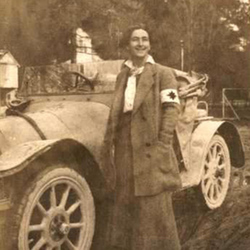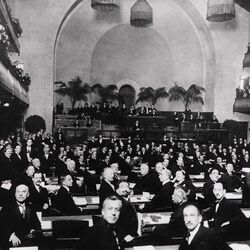Women's International League for Peace and Freedom
Informal meeting of members of International Executive and Helpers in Assembly Work present in Geneva, September 7th, 1926.
Present:
Jane Addams
Catherine Marshall
Martha Larsen-Jahn
[Gertrud] Baer
Madeleine Z. Doty
H. M. Swanwick
Kathleen D. Courtney
Hilda Clark
The Executive members present agreed:
1: That the balance of ↑[illegible] francs↓ left to the credit of the W.I.L.P.F. at the end of Vilma Glücklich's term of secretaryship should be set aside as a reserve fund, to be drawn on only in case of special emergency, e.g. sudden need for calling a special international congress. An arrangement was made with the bank by which this fund could be drawn upon by any two of the following three signatures: C. Marshall, G. Baer, Cor. Ramondt-Hirschmann, on the decision of the Executive Committee as a whole.
2: That the next meeting of the International Executive should be held sometime in the spring, preferably in Geneva. The month of March was suggested.
The Executive members and those who had promised to help in the Assembly work then considered a [program] of action during the Assembly.
C. Marshall put forward suggestions for:
a. A reception to be held at the Maison Internationale for the women delegates and women officials of delegations, prominent Geneva women and women from other international organizations present in Geneva to be invited to meet them.
b. An evening meeting to be held at the Maison Internationale to do [honor] to the contribution made to the League of Nations by the smaller nations, especially in the matter of disinterested action, absence of fear and leading the way in thought.
None of these suggestions was adopted, but it was decided to invite representatives of the International Executives of the I.C.W. and I.W.S.A. to meet our own Executive members and hear a statement from Mrs. Larsen-Jahn re the Committee on Intellectual Cooperation, and if possible agree on united action for the purpose of getting more women added to the educational [Subcommittee] of that body and of asking that the appointments should be made, not arbitrarily by the Chairman of the Committee, but by consultation with the representative bodies best qualified to make nominations. [page 2]
C. Marshall then suggested a general [program] of work to be divided between those willing to undertake parts of it. She said that her idea for work at this Assembly was that it should aim at opening up paths for the coming year's work. It would probably not be possible to achieve any great results in connection with the Assembly itself, since no adequate preparations for work on these lines had been made by the national sections.
The method of work she believed in was not the sending of resolutions to the Assembly or to Committees, but a close following of the proceedings, especially in the Committee, and seeing individual delegates who showed themselves likely to be sympathetic with our point of view and who voiced policies with which we agreed. It is valuable, she believes, to get in touch with them here in Geneva, to let them know of the existence of our League, the kind of work we can do in stirring up public opinion (e.g. the British Pilgrimage for arbitration) in order to cooperate with them and the sections of opinion within the League which they represent. For the purpose of interviews, it should be remembered that delegates should be thought of in the double capacity of (a) representing a particular country, and (b) dealing with particular subjects according to the particular Committee of which they are members.
Some general things our workers do.
a) Make the small countries realize that there is ↑a↓ public opinion in the big countries which looks to them to voice its policy because the governments of the big countries won't, give them evidence of support for their policies from the peoples of the big countries.
b) Work always for publicity and democracy in League procedure and be watchful against any attempts to curtail them.
c) Work for the League using its powers and exercising its responsibility to the full, e.g. in the supervision of mandates, in protection of minorities under the Minorities Treaties, and in sending special commissions when necessary to troubled areas where the peace of the world is likely to be endangered.
Some special things our workers can do.
The British Section (a) use as widely as possible the results of the Pilgrimage. V. G. the Editor of the Journal de Genève, M. William Martin, is pretty sure to have a leader on arbitration when the subject comes up in the Assembly, and to criticize strongly the attitude of the British Government. Try to get him at the same time to call attention to the fact that there is another voice which comes from England expressing a feeling on the subject very different from that expressed by the government; and get him either to give a brief account of the Pilgrimage in his leader or to publish a specially written article on another page.
(b) Watch especially the economic policy of the British Dominions. They have always been an obstructive bloc whenever international [organization] on economic lines has been proposed. Can the British Section [organize] deputations to the Dominion, representatives at the forthcoming Imperial Conference in London, where both economic policy [page 3] and arbitration will be under discussion.
Scandinavian Sections and French Section press for the representation of the W.I.L.P.F. on the [Subcommittee] of the Committee on Intellectual Cooperation which is supposed to represent the big organizations interested in education on peace lines. Much has already been done by these Sections in this direction.
The Scandinavian Sections will probably have suggestions for further action re disarmament. The French Section has suggestions for combined action re imperialism.
Special subjects and allocation of work.
Arbitration and disarmament will be dealt with in Committee II and III. K. D. Courtney and Hilda Clark undertook to watch these Committees.Proposals for an International Economic Conference will be dealt with by Committee II, which will also have before it the report from the Committee on Intellectual Cooperation. Adela Coit undertook to watch this Committee.
Mandates and minorities will be sent to Committee V. C. Marshall undertook to watch this Committee, and Hilda Clark to attend, if possible, any of its meetings at which minority questions were discussed.
It was decided not to do any special work in connection with Committee IV (Finance) or Committee V (Social and humanitarian questions) in the latter case because so many other [organizations] are active in these questions. Mrs. Larsen-Jahn pointed out in connection with Committee IV that there was always the danger that resolutions passed by the other Committees might be stultified by the refusal of Committee IV to make the necessary financial grants.

























Comments